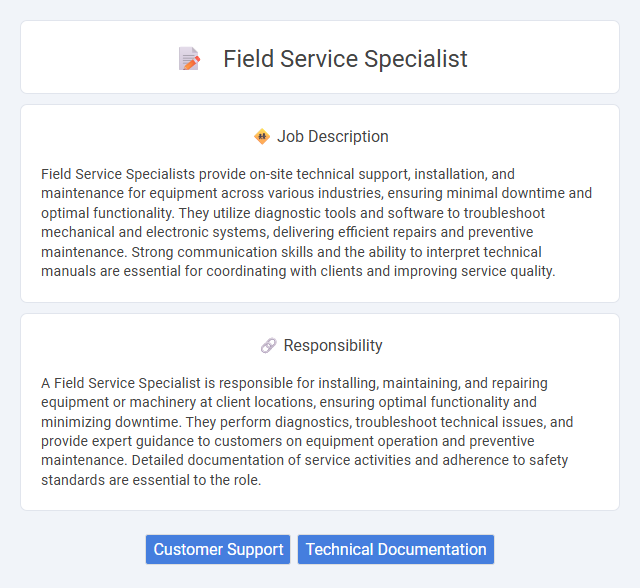
Field Service Specialists provide on-site technical support, installation, and maintenance for equipment across various industries, ensuring minimal downtime and optimal functionality. They utilize diagnostic tools and software to troubleshoot mechanical and electronic systems, delivering efficient repairs and preventive maintenance. Strong communication skills and the ability to interpret technical manuals are essential for coordinating with clients and improving service quality.
Individuals who enjoy solving technical problems and working independently in varied environments are likely suited for a Field Service Specialist role. Those who prefer routine tasks or office-based work may find this position challenging due to frequent travel and on-site troubleshooting requirements. Candidates with strong communication skills and adaptability probably have a higher chance of success in this dynamic, customer-facing field.
Qualification
Field Service Specialists require strong technical expertise in equipment diagnostics, repair, and maintenance, typically supported by a technical diploma or associate degree in electronics, engineering, or a related field. Proven experience with troubleshooting complex machinery and proficiency in using diagnostic tools and software are essential qualifications. Strong communication skills and the ability to interpret technical manuals and schematics enhance on-site problem resolution and customer support.
Responsibility
A Field Service Specialist is responsible for installing, maintaining, and repairing equipment or machinery at client locations, ensuring optimal functionality and minimizing downtime. They perform diagnostics, troubleshoot technical issues, and provide expert guidance to customers on equipment operation and preventive maintenance. Detailed documentation of service activities and adherence to safety standards are essential to the role.
Benefit
A Field Service Specialist likely benefits from hands-on experience with advanced technology and equipment, enhancing technical skills and problem-solving abilities. There is a probability of gaining diverse industry exposure, which can improve adaptability and career growth opportunities. Competitive salaries, potential travel perks, and opportunities for ongoing training may also contribute positively to overall job satisfaction.
Challenge
Field Service Specialist roles probably involve complex troubleshooting challenges requiring quick thinking and adaptability to varied technical environments. The position likely demands a strong ability to diagnose issues on-site, often under time pressure, with limited resources. Constant learning and updating of technical skills may be necessary to effectively address the evolving challenges presented by new technologies and equipment.
Career Advancement
Field Service Specialists gain valuable technical expertise and hands-on experience servicing complex equipment, positioning them for career advancement into supervisory or technical management roles. Mastery of troubleshooting, customer interaction, and compliance with industry standards increases eligibility for higher-level positions such as Field Service Manager or Technical Support Engineer. Continuous skill development, certifications, and specialization in emerging technologies amplify growth opportunities within the field service sector.
Key Terms
Customer Support
Field Service Specialists provide essential customer support by diagnosing technical issues on-site and offering efficient solutions to minimize downtime. They utilize advanced diagnostic tools and maintain clear communication with clients to ensure problems are resolved promptly. Expertise in troubleshooting, equipment maintenance, and client training enhances overall customer satisfaction and loyalty.
Technical Documentation
A Field Service Specialist excels in creating and maintaining detailed technical documentation, including installation guides, troubleshooting manuals, and service reports. Precise and comprehensive documentation ensures efficient on-site repairs, minimizes downtime, and supports knowledge transfer among technical teams. Mastery of technical writing tools and adherence to industry standards enhance the accuracy and usability of these critical service documents.
 kuljobs.com
kuljobs.com